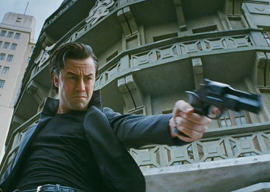
October 03, 2012

Joseph Gordon-Levitt
The bigger problem is not the superhero genre, it’s that the triumph of the trilogy format makes self-contained minor masterpieces such as Brick less feasible. We have better-planned sequels now than in the haphazard days of Exorcist II and Jaws 2, but that comes at the expense of the initial movies in the intended franchises. Original movies now come stuffed with seeming filler that will hopefully be explained in four to six years.
While Rian Johnson is an immensely clever screenwriter, he left Looper full of loose ends that I presume he hopes to tie up in a 2015 sequel and a 2018 wrap-up. Although he claims he has no intention of revisiting Looper, I have a hard time believing a writer this adept would have left the plot this sloppy if he doesn”t expect some sequels.
Spoiler Alerts:
Looper turns out to be less about the Gordon-Levitt/Willis hit man than about the childhood of a future super-villain (or superhero?), a shadowy character named The Rainmaker who turns out to be five years old.
Willis has come back from 2074 to 2044, knowing only the hospital where The Rainmaker was born and the date of his birth in 2039. He’s determined, like Arnold Schwarzenegger in Terminator, to eradicate all possible threats. Like Schwarzenegger in Terminator 2, Gordon-Levitt is pledged to protect the son and his mother.
In the 2044 present, The Rainmaker is a little boy living on a Kansas farm with his ex-party girl single mother (Emily Blunt). The kid wields his inherited telekinetic powers rather like the willful boy ruling over the small town lost in the cornfields in that terrifying Twilight Zone episode “It’s a Good Life.” (Most of the movie was shot in Louisiana for tax-break purposes, so global warming presumably explains why the “Kansas” farm is surrounded by sugar cane rather than corn.)
For reasons that Johnson has no doubt pondered deeply but chosen not to share yet with viewers, the mutant lad turns out to have been born in the same hospital on the same day as the son of Gordon-Levitt’s favorite hooker (played by Piper Perabo, who looks enough like Blunt to be her older sister). Are the two boys actually cousins who have inherited equal superpowers that they will match in a future fight? Or are they identical twins separated at birth? Perhaps they were mistakenly switched at the hospital? Or is this all a red herring on Johnson’s part?
Similarly, why does the competent head bad guy from the future (played marvelously by veteran Jeff Daniels) have an inept young minion (Noah Segan) who looks oddly like him? Are they father and son? Most likely, they will turn out to be the same character at different ages, whose evolution Johnson intends to explain in some later installment. But devoting an inordinate amount of screen time to the seemingly pointless misadventures of the flunky drains momentum from Looper.
Finally, who is The Rainmaker’s father? This question is never asked in the movie, but it hangs over the story line about an orphan of destiny.
Unfortunately, possible sequels mean this movie isn”t quite as good as if Johnson had given this one his best shot.
While critics have been enthusiastic about this high-IQ film, the paying public has been ambivalent enough that there may not be sequels. Looper made an unspectacular $21 million its first weekend in the US, although it may have opened large enough in the rapidly growing Chinese market to justify a franchise. There’s a gratuitous Shanghai interlude that is driving Chinese audiences wild. Looper is reportedly the first American movie ever to open larger in China than in North America. (Perhaps Chinese moviegoers believe those rumors that exasperate Gordon-Levitt?)
One irony about dystopian sci-fi and comic-book movies is that although leading men may be slightly East Asian in the future, American slums will be mostly white, with everybody else black. Much like the Matrix series, Hispanics don”t exist in Looper‘s vision of America in 2044.
While climate change is a favorite subject of sci-fi movies, demographic change is not. With the exception of Blade Runner (set in an Asian-dominated Southern California) and, to a lesser extent, Idiocracy (where America in 2505 is about as Mexican as Texas in 2005), sci-fi movies have shown zero interest in projecting out current changes in ethnicity.
In Steven Spielberg’s Minority Report, for instance, Washington, DC in 2054 is all white. Considering recent gentrification trends, that prediction may come true.
But the burgeoning East Asian market for American action movies appears even less interested in watching movies about Latinos than Latinos are.